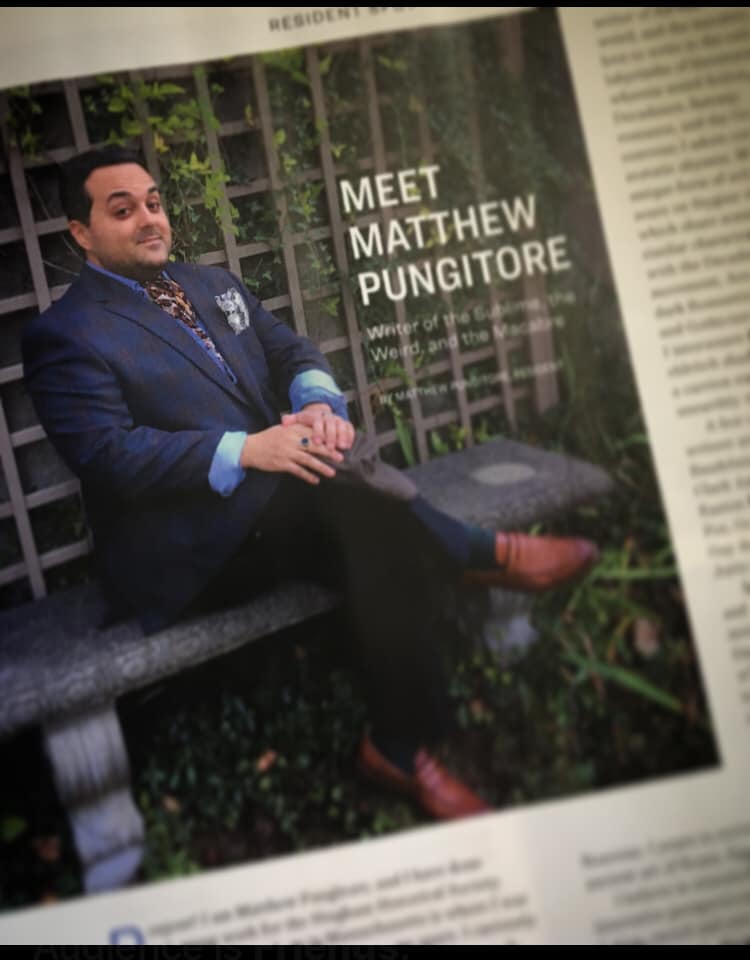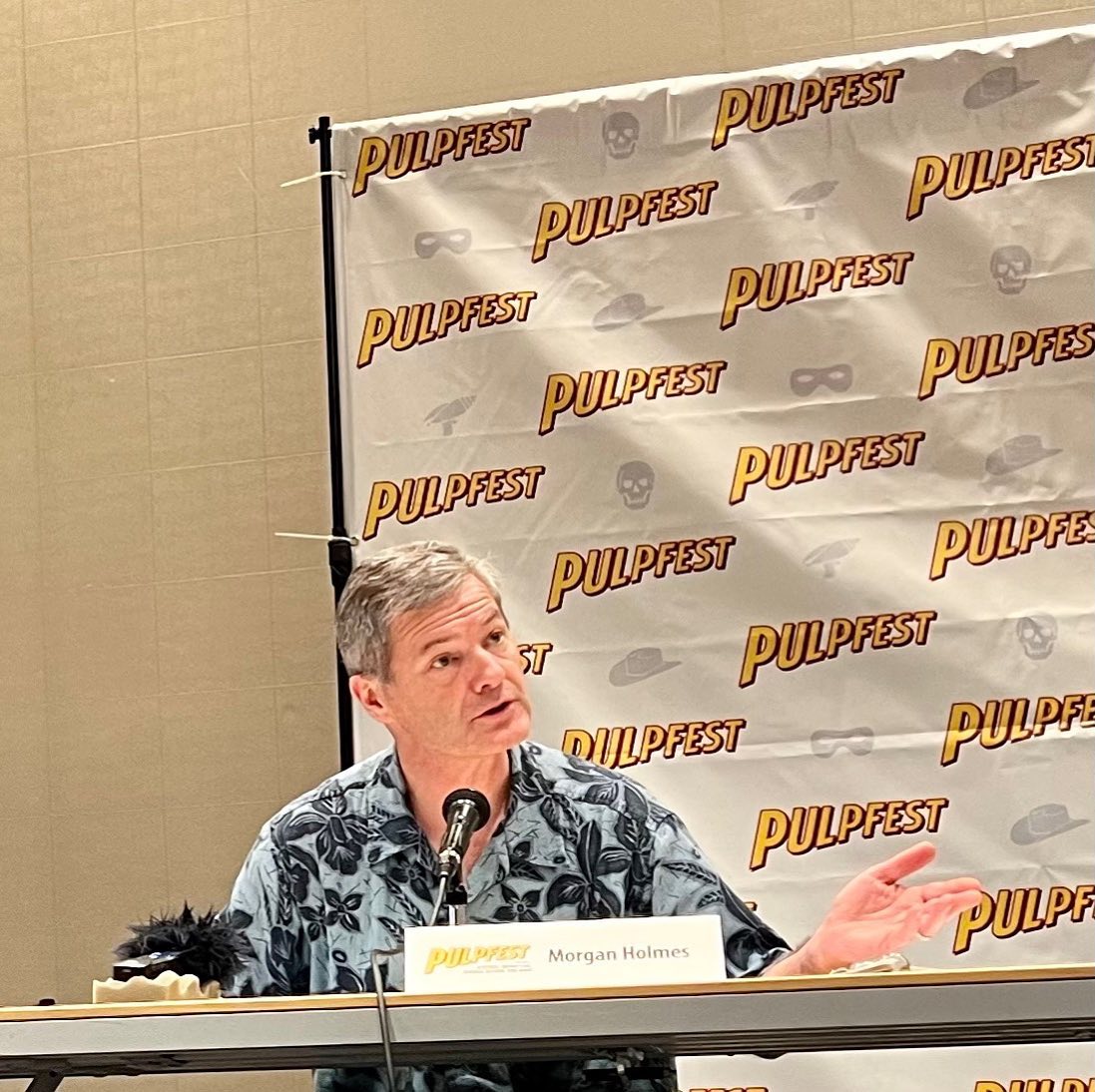An Interview with Morgan Holmes By Matthew Pungitore
Ciao! My name is Matthew Pungitore, and in this article, I’ll be talking with Morgan Holmes. So, without further ado, let’s caper like a comet to the interview.
Matthew Pungitore: “Morgan, I’m honored to be able to have this opportunity to talk with you like this. I have known you to be an intelligent, interesting fellow. Now, especially for those who might not be so familiar with your work and achievements and such, could you please tell us who you are, what you do, what you have worked on, and a little about yourself? Maybe about your hobbies, where you’re from, your professional work, and whatnot?”
Morgan Holmes: On the cusp of becoming a cranky old man. Been reading fantastic fiction since the middle 1970s. Evenings and weekends are divided between escaping our reality mainly in reading, both fiction and non-fiction. Weather permitting, I like long walks, sometimes a little jogging, some 5-6 mile bike rides. I like seeing wildlife whether deer, foxes, beaver, etc.
Matthew Pungitore: “Personally, I think 2023 has already started off quite ruinous, and maybe it is a sign of darker things to come. I hope things have been better for you. It has been a dark year so far. Would you say that we are living in riotous times, Morgan?”
Morgan Holmes: We are in what Robert Heinlein described in his future history as “the Crazy Years,” described as “when rapid changes in technology, together with the disruption those changes caused in mores and economics, caused society to, well, go crazy. They ran from the last couple of decades of the 20th Century into the first couple of decades of the 21st.”
We live in a society that ceased to be serious after the collapse of the Soviet Union. That existential threat kept some societal discipline that dissipated rather quick. People can indulge their neuroses if they don’t have to worry about food, shelter, heat, or dying of a scratch from a dirty nail. Whether this is transitory like the Iconoclasts in the Byzantine Empire or the inevitable decline that happens to every civilization is still speculation.
Matthew Pungitore: “Is there some kind of shift happening where people are looking back towards the ancient past for deeper, more metaphysical sensations? Could that be why some flock towards the sword-and-sorcery genre? For you, what does the fate of sword-and-sorcery look like from here?”
Morgan Holmes: Robert E. Howard hardly ever mentioned the future in his fiction. He did a couple times, one unpublished story has robots exterminate mankind. Sword & sorcery is a mythology for the 20th Century. The Western is a sort of myth cycle for the United States but it has declined in popularity. Sword & sorcery is a mix of romanticism, reaction to industrialization and WWI where western civilization attempted to commit suicide. We don’t have our own Beowulf or Odyssey. Conan, Fafhrd & the Gray Mouser, Elric are heroes for a world that is different from a few hundred years ago.
Interest in sword & sorcery is cyclical. It seems to peak in times of social stress while receding in hopeful, prosperous times. The hero vs. the supernatural story certainly is found in many cultures around the world. People will be making hero stories thousands of years from now.
Matthew Pungitore: “Do you believe that the people of our day have lost something? Do you believe that society might be better served by connecting with the spiritual, the sorcerous?”
Morgan Holmes: I think there is loss when populations urbanize. They exchange dawn to dusk back breaking toil but attitudes change due to the break with the past. As to spirituality, as long as it has some tradition. Lots of con-artist “follow me and I will show you the way” types ready to take advantage of people. I don’t think connecting with the “sorcerous” is a good idea.
Matthew Pungitore: “Do you have an interest in astrology, astronomy, and the occult? If you do, how did you journey into these fields? And how much significance do you attach to them? What is so fascinating and important and powerful about ritual, the constellations, and outer space? And do you see them as linked?”
Morgan Holmes: I have some interest in astronomy. I used to read a lot of Poul Anderson. His space opera used to go into different types of suns, gas giants etc. I find the new telescopic images of nebulae and other galaxies with awe. Recent pictures of Pluto with the different topography and colors are stirring. Lovecraft would have loved it.
I have seen too many horoscopes in the paper with wrong predictions for me to follow it in any way. I have books by Montague Summers on werewolves, vampires, and witchcraft. Good source material for writing fiction. Manly Wade Wellman made good use of rural folklore in his weird fiction.
Matthew Pungitore: “It is my understanding that the ancient Romans believed comets were portents of doom; and right now (02/02/2023), I believe we have some kind of a green comet soaring through the upper heavens. Right? Isn’t there some kind of a green comet that has been flying over Earth since maybe January of this year? I could be completely wrong. Now, this comet situation that people have been talking about has me a bit spooked, considering how strange this year has already been and how eerily everything appears to have been altered. Have you yourself seen it, the comet I speak of? Do you attribute any supernatural, astral influence to this comet? For you, does the comet mean anything? Or is it just an old ball of gas, ice, and/or dust?”
Morgan Holmes: I saw the green comet two nights in a row. You could make out the green. The one back in 1997 was more impressive in the sky. Comets have affected history. One was present in 1066 when Duke William the Bastard of Normandy was building his fleet to invade England. One of my favorite Clark Ashton Smith stories is “The Beast of Averoigne.” It is a nice melding of Gothic and cosmic horror as the creature arrived in medieval France on a comet.
Matthew Pungitore: “What strength do you find in the esoteric? Should more people get involved with it, or do you believe it is something that has to call out to a chosen few?”
Morgan Holmes: I think being aware of evil is of benefit. A recurring theme in myth is how the quest for forbidden knowledge ends disastrously. I would recommend reading William Michael Mott’s Caverns, Cauldrons, and Concealed Creatures. Mike has come up with a good unified theory to explain various strange and paranormal phenomena. He points out the repeating story of people making deals with otherworldly beings and bitterly regretting it.
Ever read about Catholic priests who perform exorcisms? There is some stuff on Youtube that will chill you to the marrow of the bone. Maybe Lovecraft was right there are things we are not meant to know.
Matthew Pungitore: “You yourself have done some writing in the past, have you not? Can you tell us about what you’ve published, your books, any stories or other writings you’ve done? Where has your work appeared? Are you working on any literary piece at the moment? Have you ever considered writing about the occult and/or the metaphysical?”
Morgan Holmes: I have one story in the anthology Dreams in the Fire. It is my Conan meets Tarzan and Imaro story though none are named. I do some writing for the small press. Been published in The Cimmerian, Blood N’ Thunder, The Pulpster, Crypt of Cthulhu, The Unique Legacy of Weird Tales, and a new edition of The Weird Tales Story.
Matthew Pungitore: “Before we reach the end of this fine chat, let’s really focus in on the past. If you could meet any great, historical figure, who would be that person? And is there anything you would want to ask them? Would you want to work with them? Just have a drink with them? Fight them one-on-one?
Morgan Holmes: I would like to meet Robert E. Howard. I think we would have a long into the night talk with some beers consumed along the way. Quintus Sertorius who rebelled against Rome and led Celts in Spain might be interesting to meet. If there is a person I would fight, it would be Col. Masanobu Tsuji. My uncles who fought in WW2 were all in the Pacific. I was brought up that the Pacific War was a righteous crusade against the modern day equivalent of Genghis Khan’s Mongol hordes. Tsuji was a bad man. Responsible for massacres of wounded British troops in Malaya and went to the Philippines in time for the Bataan Death March. He urged Japanese to be a cruel as possible to the starving, disease ridden Filipino and American troops. Easily 10,000 died in the Death March.

Matthew Pungitore: Morgan, I want to thank you for taking the time to talk with me today. I hope you have had a lot of fun with this. This has meant a lot to me. I wish you and yours the best of luck. I hope you have super success with your future projects. You are a good man. May the gods be with you. Is there anything profound or important you would like to add in conclusion?
Morgan Holmes: Thanks. This is something a little different but you need to break monotony. I would say don’t watch T.V, read, get fresh air outside every day. Try to cook from scratch. Get exercise and keep the weight down. A half hour walk at 3-4 mph every day puts things in perspective. Be prepared for bad things. Society collapses when nine meals are missed and people consistently go cannibal through history at 28 days if starving.
Matthew Pungitore has also interviewed Alex of Cirsova Magazine (the interview appeared on the Castalia House blog). Matthew is the author of “The Tale of Marius the Avenging Imp” (DMR Books, Samhain Sorceries, 2022). Matthew is the author of The Report of Mr. Charles Aalmers and other stories, Fiendilkfjeld Castle, and Midnight’s Eternal Prisoner: Waiting For The Summer. His story “To a Dead Soul in Morbid Love” will appear in Cirsova, Fall 2023! Matthew Pungitore has an editorial published in Aegeon issue 5, and some stories by Matthew will be published in different issues of Aegeon coming soon, depending on whenever this interview article is published.
Please give us your valuable comment